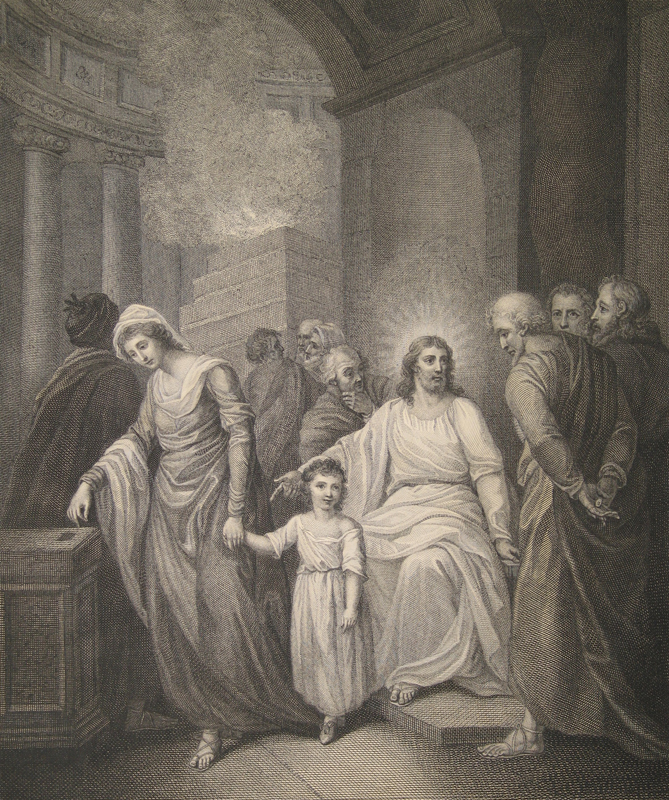
The Widow's Mite
The Macklin Bible, 1794
My dear friends,
The story of the Widow's Mite, found in the Gospel of Mark, is a profound teaching that reveals the nature of true generosity. From a Buddhist perspective, this story invites us to reflect on the purity of intention behind our actions and the value of giving without attachment. In both Christian and Buddhist traditions, the spirit of selfless giving is celebrated as a pathway to spiritual liberation. Let us explore this story through the lens of wisdom and compassion.
is the absence of possessiveness.
- Atiśa (982 - 1054), The Best
In this story, Jesus warns against the behavior of the scribes who seek honor, status, and external validation. From a Buddhist perspective, this behavior is rooted in grasping and attachment to the self, which obscures our true nature. The desire for recognition and praise, like the desire for wealth, fuels the cycle of samsara, the endless rounds of suffering. When we act out of such desires, our actions, no matter how grand they may appear, become tainted by self-interest. Generosity, in its truest form, arises not from a desire for acknowledgment but from a deep sense of compassion and the recognition of interconnectedness. True giving is not about what we offer, but the purity of the intention behind it.
who like to walk around in long robes and to be greeted with respect in the marketplaces
and to have the best seats in the synagogues and places of honor at banquets!"
- Mark 12:38-39
Here, Jesus points out the hypocrisy of those who crave the external trappings of spirituality while neglecting its essence. This is akin to the Buddhist understanding of spiritual materialism, where one uses spiritual practices to reinforce the ego rather than diminish it. The scribes’ attachment to status and recognition blinds them to the suffering of others, leading them to exploit the vulnerable. This behavior is a manifestation of ignorance, one of the Three Poisons that binds beings to the cycle of suffering. When our practice becomes a tool for self-aggrandizement, it ceases to be a path to freedom. Instead, we must cultivate humility and remember that spiritual life is not about elevating ourselves, but about lowering our defenses so we can serve others with a pure heart.
They will receive the greater condemnation."
- Mark 12:40
The condemnation here is not for the act of prayer but for the insincerity and hidden motive behind it. In Buddhism, actions are judged not merely by their external appearance but by the intention (citta) behind them. When acts of piety or charity are used to conceal greed and exploitation, they create karmic seeds that lead to further suffering. The scribes’ exploitation of the vulnerable, masked by outward displays of religiosity, is a deception that causes harm. Likewise, on our spiritual path, we must constantly check our motives, purifying our intentions so that our actions are not tainted by self-serving desires. True prayer or meditation arises from a heart that is free from attachment, longing for the well-being of all beings.
Many rich people put in large sums.
A poor widow came and put in two small copper coins, which are worth a penny.
Then he called his disciples and said to them,
"Truly I tell you, this poor widow has put in more than all those who are contributing to the treasury.
For all of them have contributed out of their abundance,
but she out of her poverty has put in everything she had, all she had to live on."
- Mark 12:41-44
The widow’s offering, though small in material value, was immense in its spiritual significance. In Buddhism, there is the teaching of the paramita (perfection) of generosity, where the true merit of giving is measured not by the size of the gift but by the selflessness and intention behind it. The widow’s act was an expression of complete trust, letting go of attachment even to her last means of sustenance. She embodied the spirit of dana (generosity), which is free from clinging and possesses the wisdom of impermanence. In her small act, she demonstrated that true wealth is not found in material possessions but in the richness of a heart unbound by fear and desire.
The story of the Widow's Mite invites us to reflect deeply on our own lives. Are we giving out of abundance, seeking to reinforce our sense of self, or do we give from a place of true compassion, without expectation or attachment? In both the Christian and Buddhist paths, the ultimate goal is the liberation of the heart. By letting go of our attachments, we open ourselves to the vastness of love and wisdom. May we all learn from the example of this poor widow, whose small but profound act of selflessness reminds us of the power of pure, unconditional giving. Let our practice be one that seeks not to gather but to give, not to elevate ourselves but to serve others with an open heart.